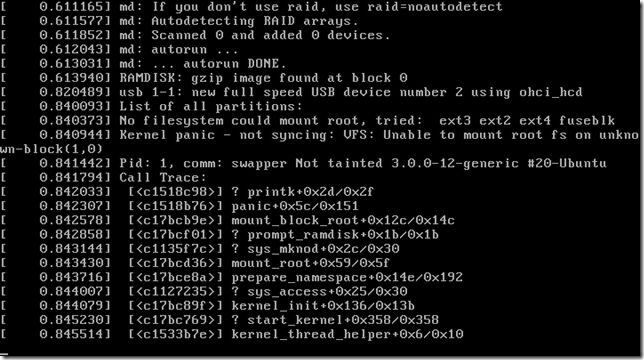上文:http://www.cnblogs.com/long123king/p/3549701.html
1: static int __init kernel_init(void * unused)
2: {
3: ......
4:
5: if (!ramdisk_execute_command)
6: ramdisk_execute_command = "/init";
7:
8: if (sys_access((const char __user *) ramdisk_execute_command, 0) != 0) {
9: ramdisk_execute_command = NULL;
10: prepare_namespace();
11: }
12:
13: /*
14: * Ok, we have completed the initial bootup, and
15: * we're essentially up and running. Get rid of the
16: * initmem segments and start the user-mode stuff..
17: */
18:
19: init_post();
20: return 0;
21: }
如何在Source Insight中查找sys_access在哪里,直接找是找不到了,不如通过”Ctrl + /”来全局查找,查找:
1: SYSCALL_DEFINE2(access
这里面是对/init做一下检测,看看是否存在该文件,sys_access用来检测是否有权限访问该文件。
返回值不为0,代表无法访问该文件,就执行prepare_namespace另作准备。
如果这里可以访问/init文件,那么就直接调用该文件来进行初始化设置。
因此,可以推测,prepare_namespace与initrd中的/init的作用类似。
1: /*
2: * Prepare the namespace - decide what/where to mount, load ramdisks, etc.
3: */
4: void __init prepare_namespace(void)
5: {
注释的意思,决定挂载点,加载内存盘。
1: if (root_delay) {
2: printk(KERN_INFO "Waiting %dsec before mounting root device...\n",
3: root_delay);
4: ssleep(root_delay);
5: }
是用来在挂载根文件系统之前,等待某些比较慢的IO设备准备好根设备。
root_device_name就是我们在grub中通过root=/dev/sda1设置的根文件设备。
1: static int __init root_dev_setup(char *line)
2: {
3: strlcpy(saved_root_name, line, sizeof(saved_root_name));
4: return 1;
5: }
6:
7: __setup("root=", root_dev_setup);
1: if (saved_root_name[0]) {
2: root_device_name = saved_root_name;
3: if (!strncmp(root_device_name, "mtd", 3) ||
4: !strncmp(root_device_name, "ubi", 3)) {
5: mount_block_root(root_device_name, root_mountflags);
6: goto out;
7: }
8: ROOT_DEV = name_to_dev_t(root_device_name);
9: if (strncmp(root_device_name, "/dev/", 5) == 0)
10: root_device_name += 5;
11: }
对于root=/dev/sda1,将root_device_name设置成sda1。
ROOT_DEV = name_to_dev_t(root_device_name);
在这之前,已经获取到了ROOT_DEV的描述符。
1: if (initrd_load())
2: goto out;
3:
4: /* wait for any asynchronous scanning to complete */
5: if ((ROOT_DEV == 0) && root_wait) {
6: printk(KERN_INFO "Waiting for root device %s...\n",
7: saved_root_name);
8: while (driver_probe_done() != 0 ||
9: (ROOT_DEV = name_to_dev_t(saved_root_name)) == 0)
10: msleep(100);
11: async_synchronize_full();
12: }
13:
14: is_floppy = MAJOR(ROOT_DEV) == FLOPPY_MAJOR;
15:
16: if (is_floppy && rd_doload && rd_load_disk(0))
17: ROOT_DEV = Root_RAM0;
18:
19: mount_root();
20:
21: devtmpfs_mount("dev");
22: sys_mount(".", "/", NULL, MS_MOVE, NULL);
23: sys_chroot((const char __user __force *)".");
如果initrd_load()成功了,就跳过mount_root这一步,这表明initrd_load()如果成功,就已经将root根文件系统给挂载好了。
否则,调用mount_root/mount_block_root,尝试以各种可能的文件系统挂载根文件系统
1: static char * __initdata root_fs_names;
2: static int __init fs_names_setup(char *str)
3: {
4: root_fs_names = str;
5: return 1;
6: }
7:
8: static unsigned int __initdata root_delay;
9:
10: __setup("rootfstype=", fs_names_setup);
1: static int __init do_mount_root(char *name, char *fs, int flags, void *data)
2: {
3: int err = sys_mount(name, "/root", fs, flags, data);
4: if (err)
5: return err;
6:
7: sys_chdir((const char __user __force *)"/root");
8: ROOT_DEV = current->fs->pwd.mnt->mnt_sb->s_dev;
9: printk(KERN_INFO
10: "VFS: Mounted root (%s filesystem)%s on device %u:%u.\n",
11: current->fs->pwd.mnt->mnt_sb->s_type->name,
12: current->fs->pwd.mnt->mnt_sb->s_flags & MS_RDONLY ?
13: " readonly" : "", MAJOR(ROOT_DEV), MINOR(ROOT_DEV));
14: return 0;
15: }
因此,这里的错误在于,没有正确地执行initrd中的初始化程序,也没有成功地mount根文件系统。
明明是ext2的根文件系统,为什么没有被mount上呢?这是问题的根本原因。
